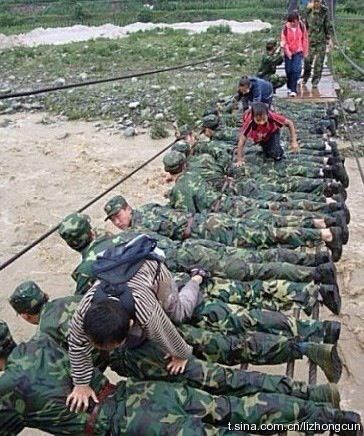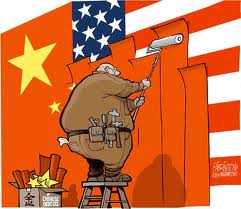The geniuses bringing us the Sinica podcasts over at Popup Chinese continue to outdo themselves, with this week’s discussion touching on one of my favorite topics, The Peking Duck and its commenters. More on that in a moment.
The first half of the podcast is an examination of the bizarre story of the fall of the popular Chinese comedian Guo Degang, yet another case study of the excesses of the Chinese media, the group-think of the news manipulators, the effect of the Chinese internet in increasing the decibel level, etc. Listen to the podcast just for that. (And if Guo Degang is the same comedian as the one I referenced in this post from 2.5 years ago, I can confirm that he is truly hilarious; scroll down for the photo.)
It’s in the second half of the podcast, about 16 minutes in, that the issue of China apologists in general and Shaun Rein in particular comes up, with a few references to my post from last week. It appears to have put the estimable Mr. Rein on the defensive, and he delivers an audio “postcard” toward the end of the podcast, explaining, to his satisfaction, why he is no China apologist.
Much of Rein’s defense revolves around the dust-up over this notorious column from seven months ago, published under the Forbes banner and including the usual obligatory plugs for his marketing business. Go back and read it now if you haven’t already. You can’t really understand why Shaun is an issue without studying this column (or my post about it). In particular, his assertion that real poverty has been nearly eradicated touched a number of nerves, an assertion he clarifies in his postcard, explaining he meant there is no longer severe malnutrition and starvation. And I accept his clarification, and I basically agree with him. The only problem is that he didn’t make this clear in his touchy-feely column, which read like a love ballad to China. Had he thrown in the explanation about malnutrition this might have been a non-issue. But this was just one aspect of how Rein tends to whitewash China’s problems and consistently put forward an image of China that must give the CCP multiple orgasms. From the same column:
Like many teenage boys, China still has a few pimples. It needs a few more years in college to fully emerge as an adult. It has new muscles, but it also has much to learn from the U.S. and the rest of the world.
You can’t blame China for its wrongs. Like a teenage boy with raging hormones, it doesn’t have the capacity for good judgment. Let’s give China space. Let China be China.
As for the rest of the postcard: Rein and I actually are more in agreement about China than you’d think. I completely agree with him that the government has done a great deal of good and made huge strides since reform began. I agree that a lot of people in China are happy. I agree that the Chinese people enjoy a high level of personal freedoms (as long as they remember their boundaries). I have posted countless times here that in terms of social freedoms China is up there almost with the US, and in some ways seems even more liberal. (Of course, there are “on the other hands” for each of those claims.)
The problem is when Rein makes gob-smacking and bewildering assertions, as we see in the very first sentence of his column on North Korea:
Perhaps she was spending too much time planning Chelsea’s wedding, but Hillary Clinton’s recent announcement of a strategy to institute more economic sanctions against North Korea was misguided and half-baked.
FAIL. As multiple commenters have pointed out in the comments there, on the comments here and the comments at Modern Lei Feng, this demonstrates shockingly poor judgment for a columnist writing for Forbes. It’s challenging to think of a more sexist opening to an article. Imagine if we were critical of an Obama decision, and started off our critique by saying it was perhaps due to his being too caught up in planning for his daughter’s wedding. Yet this kind of WTF out-of-left-field whopper permeates Rein’s columns – whenever he writes about topics outside his area of expertise.
I have one issue with an assertion made on the podcast by Jeremy Goldkorn. Jeremy is not a good friend of mine, he is a great friend, and for many reasons he is one of those people I would follow off a cliff. But I must take issues with this:
There was a knee jerk reaction on the part of many commentators, and I’m thinking mainly of Richard, who’s a friend of mine at Peking Duck and his followers, who were like, “Obviously this guy is totally insane” – because, for all of those people Kim-Jong Il is the guy who was in Team America, he is a completely ridiculous dictator. North Korea is completely beyond any hope of redemption, and the ony thing to do is put them back in the Stone Age.
For your reference, here is the entire post Jeremy is referring to:
Modern Lei Feng fisks Shaun Rein’s latest creation. (For those of you who are new to this site, here’s my first post about Rein from half a year ago.) Go read the new post now,
I’ve enjoyed several of Shaun’s columns about marketing in China and I respect his obvious intelligence and experience. But he should never, ever be allowed to write about foreign policy or politics or global economics. He’s great when he’s writing about stuff like the 8-story Barbie Doll shop in Shanghai. When he writes about economic sanctions against North Korea, however, he only embarrasses himself.
(And let me add: I embarrass myself every day, and rarely know what I’m talking about. But I’m not writing columns under the Forbes banner. As I make clear in the legend up at the top, this blog is a bastion of “dilettantish punditry and pseudo-philosophy.” I warn everybody about that before they start reading.)
Okay. My question is, what did I say in this post that corroborates what Jeremy said? I mean, even a little bit? Where is my “knee-jerk reaction” to North Korea or any claims about North Korea at all? I looked for it in the comments as well, and I can’t see anything at all that backs up Jeremy’s description. The most people say is they support or don’t support the sanctions. Nothing about Kim or life in North Korea. Maybe I’m missing something. For the record, the position Jeremy attributes to me on North Korea is simply wrong. Apologies if I wrote something to make him or anyone else think otherwise.
Back to the podcast, I found Gady Epstein’s analysis at the start of the “Apologist” discussion to be the most spot-on:
What am I annoyed by with China apologists? When they talk down to people who make critiques by saying, “It’s much more complex than that, you don’t understand – it’s not black and white.” Well, we know it’s not black and white. It starts there, with this kind of patronizing attitude toward anybody who makes a critique of the system.
He doesn’t name names, and I can’t say for sure to whom he’s referring, but his point is an excellent one, If you’re going to make dramatic claims about China, you don’t knock down your critics by saying they don’t understand China, and blocking them on Twitter and dismissing them. You can read Gady’s blog post on the podcast here.
Let me close by saying I’ve had to deal with being called an apologist for three years now. I always strive to give a balanced picture of what I perceive to be happening in China, explaining in my Tibet posts, for example, that you absolutely must look at it from Chinese eyes and put aside romantic Western stereotypes. To some, any positive words about the Chinese government makes you an apologist. So it’s not a term I toss around lightly. I urge you to read Shaun’s teenage boy column and determine whether it crosses the boundaries of admiration and wades into the waters of unabashed apologism. Your call. I won’t say a word.




Comments